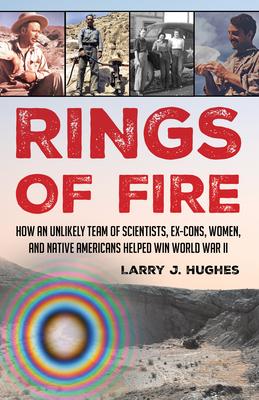"An epic story, filled with an unfolding array of evocatively described landscapes and sharply drawn, unforgettable people."
--Dayton Duncan, writer and producer for Ken Burns documentary films and author of fourteen books on American history and national parks
Edwin Land had barely settled into his seat on the plane when the flash went off. An idea for an innovative WWII technology that might help eradicate the fascist cancer devouring the free world. It was Polaroid's Optical Ring Sight, which magically projected a bullseye of brilliantly colored rings onto the sky--like rings of fire--to aim American antiaircraft guns that previously "couldn't hit the broad side of a barn."
Rings of Fire is the compelling story of American ingenuity, determination, and grit--told through the personal stories of the amazing people who transformed insight into gunsight. From scientists to ordinary Americans to drifters and ex-cons characterized as "the underbelly of America," they crossed cultural barriers to tackle a shared crisis:
- California "desert rat" artist, John Hilton, whose mining claim supplied the calcite crystals desperately needed for the device, assisted by Gen. George S. Patton.
- Miners Steve Modesto and John Owens, a Cahuilla Indian ranch hand and a white meat-cutter from Kansas, whose friendship led to an astonishing discovery.
- Moonshiner Al Hansen, whose calcite prospecting in Montana started with a lucky strike but cascaded into a wild-west vigilante showdown.
- "Crystal Crackin' Mama" Irene Frederick, whose calcite-crystal processing skills silenced male skeptics and helped rescue the Polaroid project from disaster.
- Edwin Stanton, whose hubris led to a fat FBI dossier and tragedy while prospecting in Mexico.
- Cecil Kegans, a rough Oklahoman with a huge smile, starting his Marine career by fetching groceries for calcite miners and ending it in a bloody pool on Saipan.
- And miner Harry Sikkenga, whose fist fight with a shift boss packed him off to the army artillery, just in time to invade Germany and encounter the horror of Dachau.
Teamed together, they overcame enormous personal obstacles to produce ring sights for Navy ships, aircraft, and Army bazookas. And afterwards, their product went from aiming the guns of war to the cameras of peacetime--for television and on the helmets of skydiving videographers. And then, all the way to the moon, aiming NASA's space cameras, culminating with perhaps the most influential photograph of all time, Earthrise.
Larry Hughes unfolds this gripping, never-told story with accessible explanations of the science and the art behind the project, but always lets the colorful characters drive a warm and vivid adventure.
